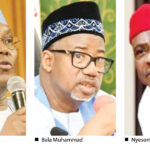This is why majority of Nigerians are sceptical about President Umaru Musa Yar’adua’s promise to reform our electoral process. Himself a beneficiary of fraudulent election, many including this writer doubt if President Umaru Musa Yar’adua will ever accept the reform of the nation’s electoral process. According to political commentators and analysts, the Justice Uwais committee report on electoral reform has provided all control measures to stop electoral rigging and manipulation; however, these were removed by the government. And the way it is now, there are many indications that the 2011 elections will be worst than that of 2007.
In a democracy the power to choose, change and remove political leaders rest with the electorates. Elections serve as an opportunity for citizens, who are the determinants of their own destiny, to exercise the power of choosing leaders who they believe can affect their lives positively through the provision of basic infrastructure. Failure to do this will result in the emergence of bad leadership and poor representation. The most basic and important principle of good governance is that a nation’s political institutions – elections, political parties and the police – must have a semblance of democracy.
That is why many argued that unless we have political parties with a clear ideology, an independent (a truly independent) electoral commission and a neutral police force, Nigeria will never taste a free and fair election. We are all living witnesses to what happened in recent years, in the 2003 and 2007 elections. Our politicians in these two elections displayed arrogantly their lack of faith in the democratic process. From the primary elections within political parties, to the general elections, it was a do-or-die affair.
But the question is can the Uwais report help in reforming our electoral process? I doubt much, because the issue rest with the citizens to say no to all forms of elections manipulations and rigging. Nigerians are not ready to do that because there is no trust between the citizens and the political leaders. Why should Nigerians sacrifice their time, resources and to some extent their lives to defend their votes when they know fully well that the person they are voting for might dump them after winning the election? This might sound pedestrian but it is the reality. The Bauchi case is a clear example.
Secondly, as a nation we lack national culture. This is basically because our school system or curriculum does not have anything like that. Was it not because of that that nationalism, as a course, was introduced in the first year of our university education?
National culture is what gives citizens a sense of direction and hope. The development of good citizens and the establishment of a nation’s identity, its outlook, its values and goals can be attained through the family, school and religious leaders. Indeed the task of instilling national culture was a sacred one, because of its far reaching consequences for the security and survival of the soul of a nation. No change or reform can succeed when majority of the beneficiaries of the reforms are ignorant of it. Electoral reform as important as it is cannot succeed when we ignore these basic realities staring at us. Change in our attitudes and value system is very important and can only be achieved through an educated and enlightened citizenry.
This is what our policy makers need to look into. Virtually all institutions driving the nation are either dead or do not function properly. The civil service, the police, the school system, the economy, democratic institutions, and the family and so on and so forth – the list is endless.
Lawanti writes from Area 11, Garki, Abuja



